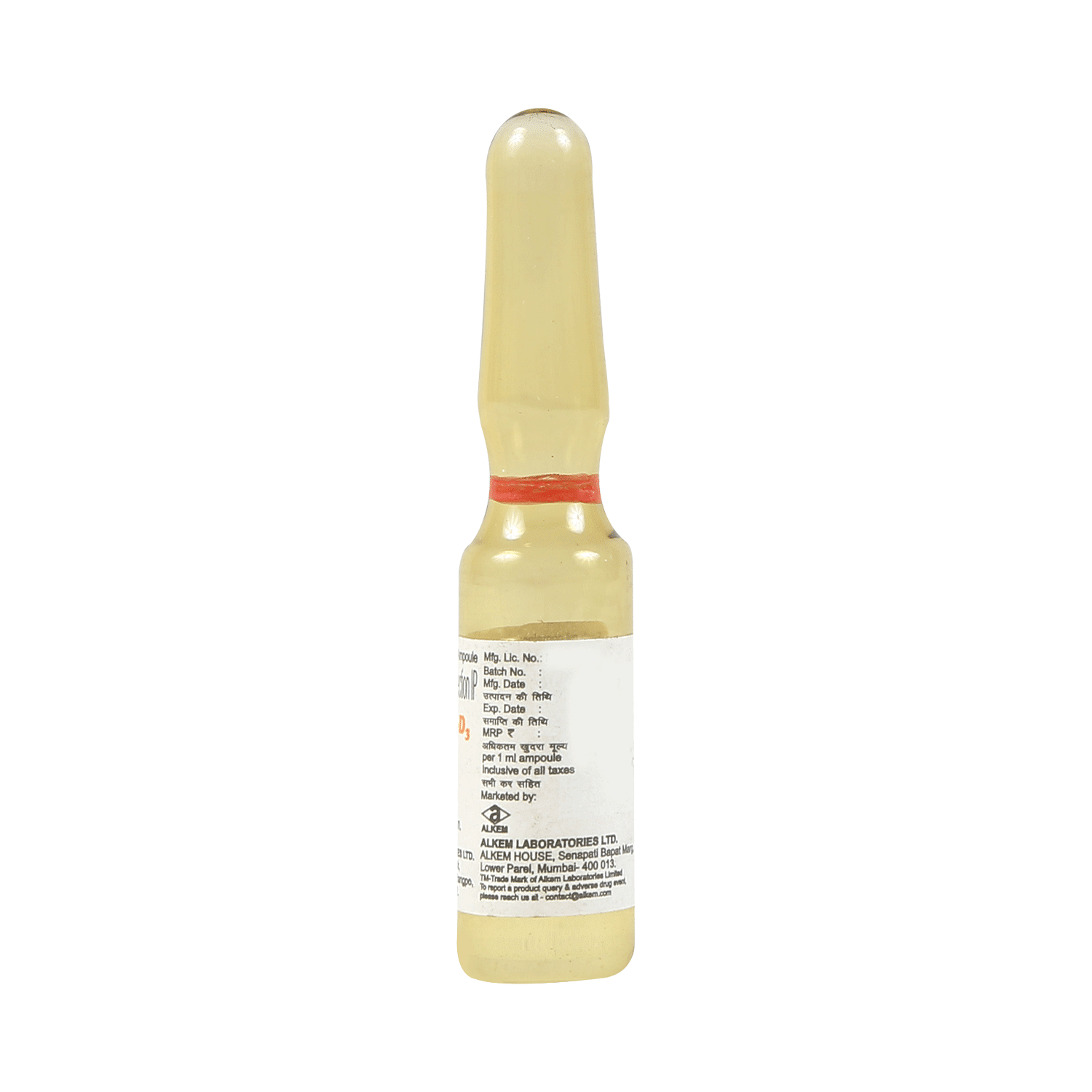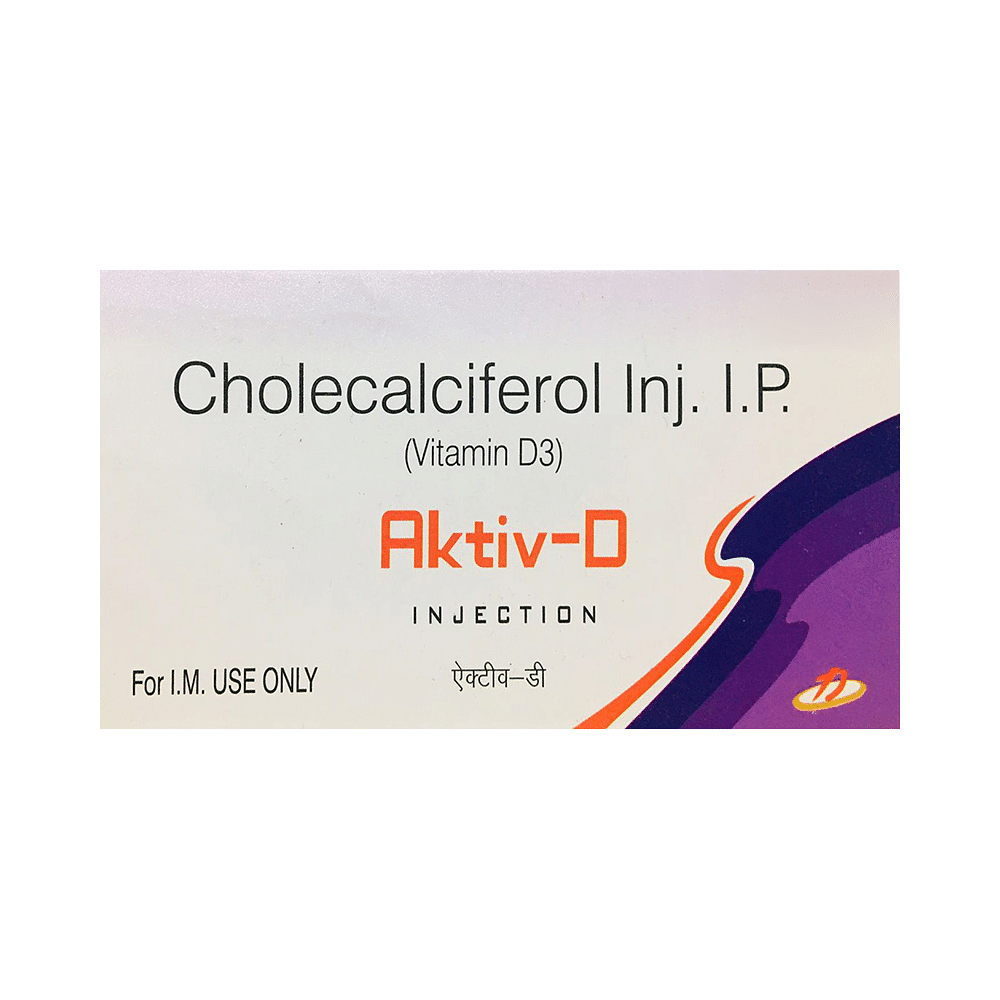
Vcor D 60000IU Injection
Manufacturer
Syndicate Life Sciences Pvt Ltd
Salt Composition
Vitamin D3 (60000IU)
Key Information
Short Description
Vcor D 60000IU Injection helps your body to absorb a mineral called calcium, which is important for maintaining strong bones. This medicine is used if your diet does not provide enough vitamin D and may be used to treat certain bone conditions such as thinning of the bones (osteoporosis).
Dosage Form
Injection
Introduction
Vcor D 60000IU Injection is given under the supervision of a healthcare professional and should not be self-administered. You should take it regularly to get the most benefit from it. If you are using it to treat osteoporosis you will be prescribed other medicines as well. This medicine may be only part of a complete program of treatment that also includes making changes to your diet and taking calcium and vitamin supplements. Learn about the foods you should eat to make sure you get enough calcium and vitamin D in your diet.
Directions for Use
Your doctor or nurse will give you this medicine. Kindly do not self administer.
How it works
Vcor D 60000IU Injection is a form of vitamin D. It raises vitamin D levels in your blood. This in turn raises calcium levels in your blood by helping you absorb more calcium from food.
Quick Tips
Get enough sun exposure 10-30 minutes thrice a week. Light-skinned: 20-30 minutes of sun exposure. Dark-skinned: 30-40 minutes of sun exposure. Eat vitamin D rich diet like egg yolk, mushrooms, cheese, milk, butter, fortified food and oily fish. Do not take antacids or any other medication 2 hours before or after taking Vcor D 60000IU Injection.
Related Medicines

Uprise-D3 6L Injection

Aktiv-D Injection

D3 60000IU Injection

Calcidoc-D3 6L Injection

Kridol-D3 Injection

Calwil D3 60000IU Injection

Sep D Injection

Caltouch 6 Injection
Frequently asked questions
What are the benefits of taking Vcor D 60000IU Injection?
Vcor D 60000IU Injection is important for maintaining bone health, supporting the health of the immune system, brain, and nervous system. It also regulates insulin levels and is important for a healthy heart and blood vessels.
At what time should I take Vcor D 60000IU Injection?
Vcor D 60000IU Injection can be taken at any time of day, morning or night. However, there is limited information available about the best time to take this medication. It is crucial to follow the prescribed schedule and dosage given by your doctor. Do not attempt self-medication.
How is Vcor D 60000IU Injection administered?
Vcor D 60000IU Injection must be administered under the supervision of a trained healthcare professional or doctor only, and should not be self-administered. The dose will depend on your individual condition and will be determined by your doctor. Ensure you follow your doctor's instructions carefully to ensure optimal benefit from Vcor D 60000IU Injection.
Who should not take Vcor D 60000IU Injection?
Patients who are allergic to cholecalciferol, individuals with elevated calcium levels in the blood or presence of calcium in urine should avoid taking Vcor D 60000IU Injection. It's essential to consult your doctor before using Vcor D 60000IU Injection if you have kidney stones or severe kidney problems.
What are the potential risks of overdose on Vcor D 60000IU Injection?
Long-term excessive use of Vcor D 60000IU Injection may lead to hypercalcemia, an increase in calcium levels in the blood. This can result in symptoms such as weakness, fatigue, vomiting, diarrhea, sluggishness, kidney stones, elevated blood pressure, and growth retardation in children.
How much Vitamin D3 should I take daily?
Vcor D 60000IU Injection is a form of vitamin D used as a supplement for those with vitamin D deficiency. The recommended daily intake of Vitamin D3 is 4,000 IU/day. However, depending on your diet and individual needs, supplementation may be necessary, ranging from 1,000 to 3,000 IU/day.
What are the symptoms of Vitamin D deficiency?
Low levels of Vitamin D can lead to rickets in children and osteomalacia in adults. It may also increase the risk of developing conditions like type 1 diabetes, high blood pressure, depression, some types of cancer, and osteoporosis.


